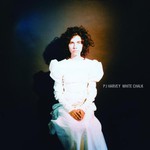White Chalk
Studio Album by PJ Harvey released in 2007The Devil | |
Dear Darkness | |
Grow Grow Grow | |
When Under Ether | |
White Chalk | |
Broken Harp | |
Silence | |
To Talk to You | |
The Piano | |
Before Departure | |
The Mountain |
White Chalk review
I'm in this for learning
Once PJ Harvey told "When I'm working on a new record, the most important thing is to not repeat myself... that's always my aim: to try and cover new ground and really to challenge myself. Because I'm in this for learning. "This was a comment about her recent album Uh Huh Her given as far back as 2004 but this frase sounds urgent up to the present moment. PJ Harvey's new album is a pretty unexpected on the one hand and fairly predicatble on the other. Unexpected because it sounds really different from any other record she ever did before and predictable because she always makes albums that sound pretty different from each other. After To Bring You My Love made her a leader of British alternative rock scene PJ Harvey released a pretty dark and partially experimental album Is This Desire? Than there was uncharchteristically melodic Stories From the City, Stories From the Sea after which she continued her discography with cheeky and intentionally raw indie punk record Uh Huh Her. However, even despite such a diverse approach to album making PJ Harvey's music was always spinning around one garage guitar axis, even when she tried to experiment, but her new album has rectified this problem.
The darkest and the most beautiful album of PJ Harvey
White Chalk is probably the most radical change of PJ Harvey's image. She set aside the guitar, which was her helpmate throughout the career and seated herself in front of piano. The result consists of eleven eerie and cold songs all surrounded by ghostly mysteriousness and gothic mist. It is hard to compare it with previous records of hers, stylistically White Chalk goes beyond any official terms, but it is clear at once – this album is her darkest and probably the most beautiful one. There is no raw aggressiveness so characteristic to her early records, no rhythmical brit pop twitching, no even pop straightforwardness of some of her recent songs, there is only cold feeling of solitude, which was crystallized out of everything else and used as a material for evolving something entirely new. The piano brings in a feeling of graceful icy fragility; its minor chords intensify the mysterious atmosphere gradually and slowly but they don't hurry to release it when a certain point is reached, they simply freeze dead like a winter tracery on a windowpane. Such a feeling is expressed really bright on a wizardly dark Grow Grow Grow for instance or on a song called To Talk To You, which sounds like a cry of a mournful ghost.
Unusual but very accessible
However, despite all mysteriousness that White Chalk holds it is pretty easy to apprehend it, depressiveness is not the only quality of these songs, it presents here and there but still there is enough place for romance too. PJ Harvey didn't mean to scare her listeners away. Such songs as The Devil or Silence sound thrilling rather than oppressive, they have a very peculiar feeling of romantic melancholy. The majority of the songs are ballads but they are so vast and emotionally strong that they can hardly fit in the borders of this tiny word. Listen to the title song, it doesn't sound really typical for this album as Harvey plays guitar here but it is really strong and moving composition. In fact, White Chalk is a unique album, the atmosphere of loneliness and mysteriousness is surely not a new thing but in this very case it was represented from absolutely new viewpoint, unusual but very accessible. There are almost no weak songs here, White Chalk sounds like one big whole and it is hardly possible to cast away even the smallest piece.

